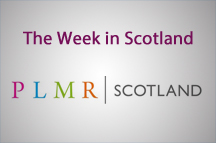 Unsurprisingly, this week Scottish politics has been dominated by the news that there will be a general election in just 7 weeks’ time – an announcement that took the entire political establishment by surprise and has reignited arguments about a second referendum on Scottish independence.
Unsurprisingly, this week Scottish politics has been dominated by the news that there will be a general election in just 7 weeks’ time – an announcement that took the entire political establishment by surprise and has reignited arguments about a second referendum on Scottish independence.
When it was announced earlier this week that the Prime Minister would be making a surprise statement at Downing Street, there was intense speculation as to the nature and content of her speech. Rumours ranged from direct rule in Northern Ireland or a second independence referendum in Scotland, to military action in the Korean peninsula or even a shock resignation.
As it was, the PM’s announcement of a general election in just 50 days’ time took the entire political world by surprise. As well as previously ruling out holding a snap general election before 2020, just last month the Prime Minister rebuffed the Scottish Government’s calls for a second referendum on Scottish independence, stating that ‘now is not the time’ and that another vote would simply increase instability and uncertainty.
However, the vast majority of MPs backed the PM’s plans in the Commons on Wednesday, and in Scotland the campaign is already being defined by the debate on independence. The Conservatives’ Ruth Davidson is doing her utmost to position her party as the ‘defenders of the union’, and the First Minster has argued that the only way to ‘protect’ Scotland from the Tories is to vote SNP.
Ms Davidson, is seeking to position her party as the only alternative to the SNP’s ‘divisive plan for a second referendum’, and frame the election in Scotland as a binary choice between the Nationalists and her unionist party. Meanwhile, the First Minister described Ms May’s announcement as ‘one of the most extraordinary u-turns in recent political history’, and a ‘huge political miscalculation’.
 Most commentators are predicting that the SNP will hold the majority of the 56 constituencies they won in 2015, with the Conservatives perhaps gaining a couple of seats and likely claiming an increased majority across the UK. If this were the case, then Nationalists will claim an increasing level of divergence between Scotland and the rest of the country, adding weight to their calls for another independence referendum. However, the Conservatives are already claiming that ‘peak Nat has passed’, and a drop in the number of SNP MPs would play into this narrative.
Most commentators are predicting that the SNP will hold the majority of the 56 constituencies they won in 2015, with the Conservatives perhaps gaining a couple of seats and likely claiming an increased majority across the UK. If this were the case, then Nationalists will claim an increasing level of divergence between Scotland and the rest of the country, adding weight to their calls for another independence referendum. However, the Conservatives are already claiming that ‘peak Nat has passed’, and a drop in the number of SNP MPs would play into this narrative.
On Thursday, First Minister’s Questions was predictably dominated by election talk, with Ms Davidson accusing the SNP of talking ‘negative trash about our country’ in an effort to further the case for independence. In a fiery exchange, the FM warned of the damage that an ‘unfettered, out-of-control Tory government can do’. Ms Sturgeon then attacked the Tory stance on the UK Government’s introduction of the so-called ‘rape clause’, which has also been criticised by Holyrood’s other party leaders.
The other main political parties in Holyrood - Scottish Labour, the Scottish Liberal Democrats, and the Scottish Greens - have all welcomed the opportunity to fight for more seats at Westminster, and expressed varying degrees of optimism about their electoral prospects.
There have also been suggestions from all the major parties that tactical voting might play a significant role in this election, with suggestions that unionists may vote for whoever is most likely to defeat the SNP locally, while nationalists could do likewise to beat the Conservatives. Given the wider uncertainty caused by a potential IndyRef2, Brexit, and the impact of May’s local elections on possible voter fatigue and therefore turnout, this could prove to be one of the most unpredictable elections in Scotland for generations.














